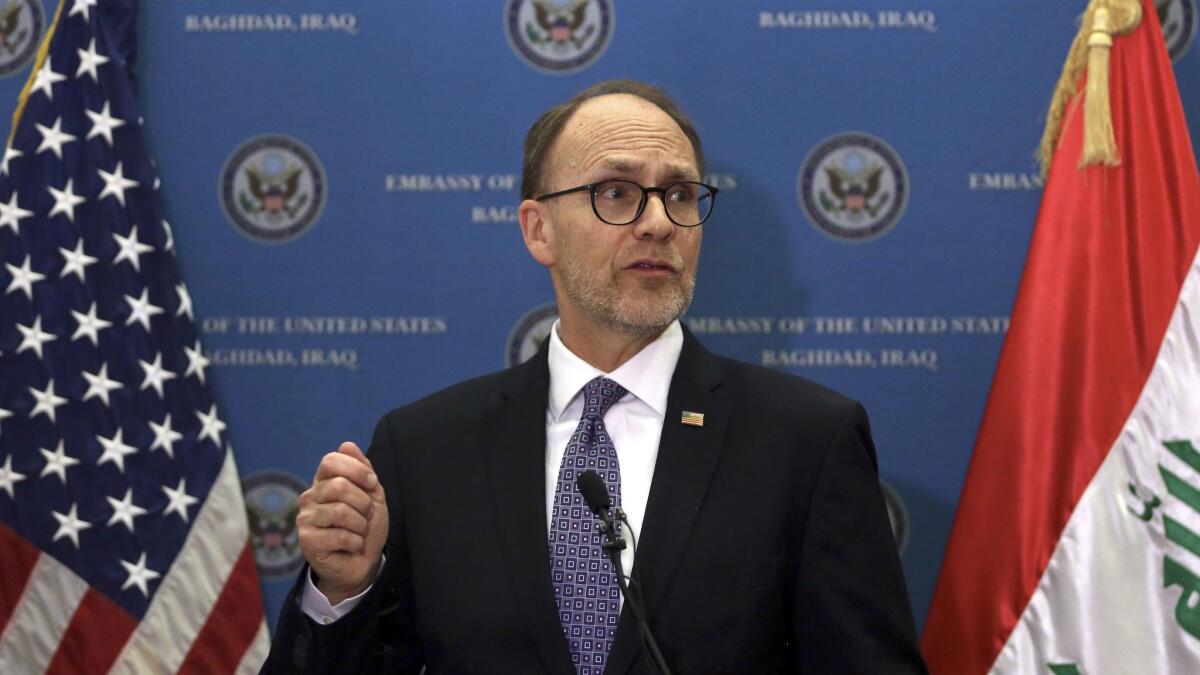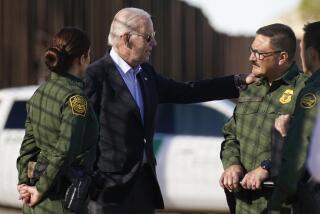Iraqis thought they had a special relationship with the United States. Now they’re furious over Trump’s travel ban

- Share via
Reporting from Beirut — At Café Baghdad, a gathering spot in Beirut for many Iraqis and Syrians who fled violence in their countries, the conversation Monday was of little but the U.S. travel ban.
“What’s the fault of the families and children here?” said 50-year-old Mounir Gerges, whose voice rose in indignation as he watched a group of his friends play dominoes.
Like other cafe patrons, he feared that more countries would adopt the same hard line as the Trump administration. A former government employee in Iraq, Gerges worried that his application to join his family in Australia would be delayed.
“The U.N. is doing nothing for us about this,” he said. “It’s been three years with them going slow, and now this.”
President Trump’s executive order — which blocks travel from seven predominantly Muslim countries — has caused anger and resentment across the Muslim world, but nobody has felt it so sharply as Iraqis.
Their nation’s army has fought side-by-side with the Americans on the war against Islamist extremism. A major battle is underway right now: American forces are backing Iraqi and Kurdish fighters as they seek to drive Islamic State militants from Iraq’s second-largest city, Mosul.
“Iraq is on the front line of the war on terrorism,” the parliament’s foreign committee said in a statement Monday. “It is unfair that the Iraqis are treated in this way.”
In comments directed at the Trump administration, Muqtada Sadr, a powerful Shiite cleric and political leader, said on his website, “It would be arrogance for you to enter freely Iraq and other countries while barring to them the entrance to your country ... and therefore you should get your nationals out.”
Parliament was pressuring the Iraqi government to retaliate with measures that would do just that.
“Why is it on us Iraqis?” said Meshan Jboori, a lawmaker from a Sunni faction. “And no Iraqi has ever conducted any terrorist attack in the U.S.
“As for those Americans who are here, I think they should leave,” he said. “If they don’t want to back down, then they should leave, yes, even the fighters. I’m sure Russia will be willing to take their place and give us the support we need to defeat terrorism.”
Trump’s executive order, which blocks entry of all Iraqi citizens for 90 days, also includes Iran, Libya, Somalia, Sudan, Syria and Yemen. It also keeps out all refugees for 120 days and Syrian refugees indefinitely. Trump said it was aimed at keeping terrorists out of the country while giving the government time to strengthen its vetting procedures.
In Washington, the order left Trump’s most senior Cabinet members struggling to contain the fallout. Defense Secretary James N. Mattis, who began work the day the order came down, was reportedly not consulted in advance about the directive.
The Pentagon, which has 5,000 U.S. troops in Iraq, was seeking to shield Iraqi citizens who have worked with the U.S. military from the travel ban, compiling a list of Iraqis it will recommend for exemption.
The U.S. ambassador to Iraq, Douglas A. Silliman, who took up his post less than five months ago, was meeting with Iraqi lawmakers to try to stave off a vote for Iraq to respond in kind to the U.S. restrictions.
Thousands of American contractors work in Iraq. Business deals, including arms sales and energy, run into the billions of dollars. U.S. troops and diplomats have for years depended on Iraqis working alongside them, sometimes in life-or-death situations. There is close intelligence cooperation between the two countries.
Diplomatically, Iraq has so far been treading carefully. On Monday, the Foreign Ministry issued a statement asking the new U.S. administration to “reconsider this wrong decision.”
“We affirm Iraq’s desire to strengthen the strategic partnership between the two countries,” it said.
But officials and ordinary citizens alike said they found it baffling to be on a list that also included the failing or failed states of Libya and Yemen and avowed U.S. rival Iran.
Among those caught by surprise was Lukman Faily, a former ambassador to Washington, who said he would not be able to travel to the United States for upcoming conferences. He told CNN that Iraqis were “astonished” by the travel ban, considering it a deep affront to national pride.
Particularly galling to some was the notion that Iraqis entering the United States posed a terrorist threat, in light of the fact that few countries have been harder hit by terrorism. Suicide bombings and other attacks have killed and maimed thousands in Iraq over the last decade.
Compounding the resentment, Trump rattled Iraq with repeated assertions that the United States should have “taken the oil” when it toppled dictator Saddam Hussein. Experts said any move to seize oil reserves as spoils of war would have been in violation of international law, but Trump — who had floated the idea during his campaign — brought it up again after taking office.
“We should have kept the oil, but OK, maybe we’ll have another chance,” the president said on a visit to CIA headquarters a day after being sworn in. In the Arab world, those comments helped fuel a belief in some quarters that U.S. Mideast policy is largely predicated on a wish to plunder the region’s energy resources.
To many inside and outside Iraq, the travel ban posed the potential to undercut the U.S.-led fight against Islamic State, and at the very least provided a propaganda gift to jihadist supporters. Backers of Islamic State were cheering from the social-media sidelines, citing Trump’s move as proof that Muslims would never be accepted by the West.
Two powerful Republican senators, John McCain of Arizona and Lindsey Graham of South Carolina, said Sunday that the presidential directive could “do more to help terrorist recruitment than improve our security” by inflaming resentments against the U.S.
“We fear this executive order will become a self-inflicted wound in the fight against terrorism,” the two said in a joint statement.
Separately from the consternation in Baghdad, officials in the semiautonomous region of Kurdistan were worried as well. As Iraqi passport holders, its people fall under provisions of the travel ban. That leaves many Iraqi Kurds with U.S. ties in limbo, including students, aid workers and businesspeople.
The Kurdistan regional government, which has a separate diplomatic mission in Washington, said in a statement that it was trying to get more information from the Trump administration about the order’s scope and effects.
In Lebanon, which has been a prime refuge for Iraqis hoping to travel onward to the United States or other destinations, the directive left many despondent, said Suheil Anton, a former oil engineer who has become an unofficial spokesman for displaced Iraqi families.
“We thought that things would open up for Iraqis this year, since they would barely let anyone in last year,” he said. “But this is a betrayal of Iraqis now.”
In a shabby Beirut apartment, the wife and four children of Nizar Isaac — members of a minority Christian sect from a village outside Mosul — had been preparing to start a new life in the United States.
They were approved for refugee visas and had planned to leave Tuesday for Michigan, reuniting with a son who had arrived in the U.S. two months earlier. Five suitcases wrapped in cellophane and two red UNICEF tote bags were ready to go.
But the travel ban dashed the family’s departure hopes.
Isaac, a 52-year-old plumber, had planned to stay behind because his application was rejected. He had been distraught over the prospect of being separated from his wife and children, but that was outweighed by the desperate hope that they would find refuge in the United States.
“I didn’t know if I could follow them or not,” he said. “It was like I was getting a divorce, but I had accepted it.”
Special correspondent Bulos reported from Beirut. Staff Writer Laura King contributed from Washington.
UPDATES:
7:50 p.m.: This article has been updated with reaction from Iraqis.
This article was originally published at 4:25 p.m.
More to Read
Sign up for Essential California
The most important California stories and recommendations in your inbox every morning.
You may occasionally receive promotional content from the Los Angeles Times.











